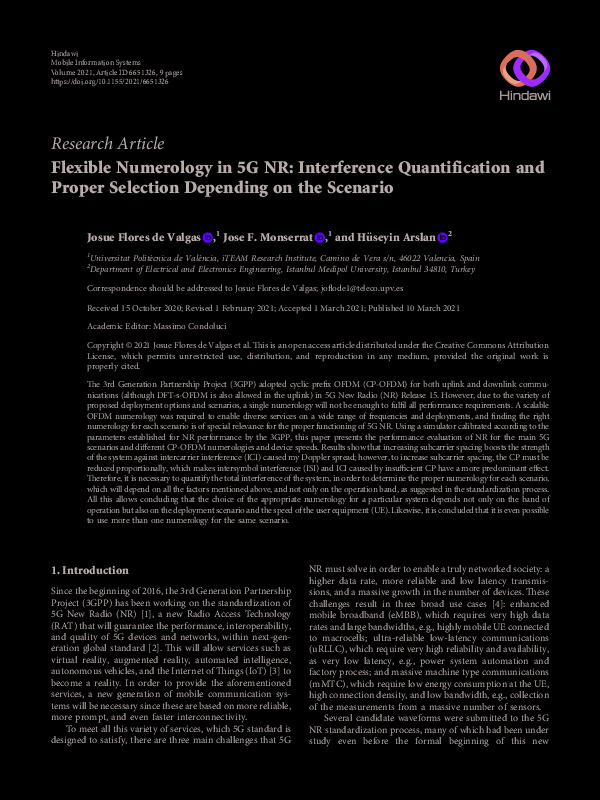JavaScript is disabled for your browser. Some features of this site may not work without it.
Buscar en RiuNet
Listar
Mi cuenta
Estadísticas
Ayuda RiuNet
Admin. UPV
Flexible Numerology in 5G NR: Interference Quantification and Proper Selection Depending on the Scenario
Mostrar el registro sencillo del ítem
Ficheros en el ítem
| dc.contributor.author | Flores De Valgas, Josue
|
es_ES |
| dc.contributor.author | Monserrat del Río, Jose Francisco
|
es_ES |
| dc.contributor.author | Arslan, Hüseyin
|
es_ES |
| dc.date.accessioned | 2023-09-27T18:01:35Z | |
| dc.date.available | 2023-09-27T18:01:35Z | |
| dc.date.issued | 2021-03-10 | es_ES |
| dc.identifier.issn | 1574-017X | es_ES |
| dc.identifier.uri | http://hdl.handle.net/10251/197242 | |
| dc.description.abstract | [EN] The 3rd Generation Partnership Project (3GPP) adopted cyclic prefix OFDM (CP-OFDM) for both uplink and downlink communications (although DFT-s-OFDM is also allowed in the uplink) in 5G New Radio (NR) Release 15. However, due to the variety of proposed deployment options and scenarios, a single numerology will not be enough to fulfil all performance requirements. A scalable OFDM numerology was required to enable diverse services on a wide range of frequencies and deployments, and finding the right numerology for each scenario is of special relevance for the proper functioning of 5G NR. Using a simulator calibrated according to the parameters established for NR performance by the 3GPP, this paper presents the performance evaluation of NR for the main 5G scenarios and different CP-OFDM numerologies and device speeds. Results show that increasing subcarrier spacing boosts the strength of the system against intercarrier interference (ICI) caused my Doppler spread; however, to increase subcarrier spacing, the CP must be reduced proportionally, which makes intersymbol interference (ISI) and ICI caused by insufficient CP have a more predominant effect. Therefore, it is necessary to quantify the total interference of the system, in order to determine the proper numerology for each scenario, which will depend on all the factors mentioned above, and not only on the operation band, as suggested in the standardization process. All this allows concluding that the choice of the appropriate numerology for a particular system depends not only on the band of operation but also on the deployment scenario and the speed of the user equipment (UE). Likewise, it is concluded that it is even possible to use more than one numerology for the same scenario. | es_ES |
| dc.language | Inglés | es_ES |
| dc.publisher | Hindawi Limited | es_ES |
| dc.relation.ispartof | Mobile Information Systems | es_ES |
| dc.rights | Reconocimiento (by) | es_ES |
| dc.subject.classification | TEORÍA DE LA SEÑAL Y COMUNICACIONES | es_ES |
| dc.title | Flexible Numerology in 5G NR: Interference Quantification and Proper Selection Depending on the Scenario | es_ES |
| dc.type | Artículo | es_ES |
| dc.identifier.doi | 10.1155/2021/6651326 | es_ES |
| dc.rights.accessRights | Abierto | es_ES |
| dc.contributor.affiliation | Universitat Politècnica de València. Escuela Técnica Superior de Ingenieros de Telecomunicación - Escola Tècnica Superior d'Enginyers de Telecomunicació | es_ES |
| dc.description.bibliographicCitation | Flores De Valgas, J.; Monserrat Del Río, JF.; Arslan, H. (2021). Flexible Numerology in 5G NR: Interference Quantification and Proper Selection Depending on the Scenario. Mobile Information Systems. 2021:1-9. https://doi.org/10.1155/2021/6651326 | es_ES |
| dc.description.accrualMethod | S | es_ES |
| dc.relation.publisherversion | https://doi.org/10.1155/2021/6651326 | es_ES |
| dc.description.upvformatpinicio | 1 | es_ES |
| dc.description.upvformatpfin | 9 | es_ES |
| dc.type.version | info:eu-repo/semantics/publishedVersion | es_ES |
| dc.description.volume | 2021 | es_ES |
| dc.relation.pasarela | S\458265 | es_ES |








